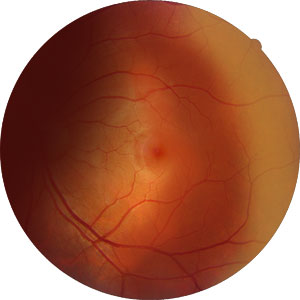| |
|
Ocular Lymphoma
is a type of cancer that attacks the cells in your immune system.
There are 3 types of ocular lymphomas:
1) Primary vitreoretinal lymphoma: a
type of primary central nervous
system lymphoma. It affects the
retina, vitreous and optic nerve.
2) Primary uveal lymphoma: affects
the choroid layer in the eye.
Image courtesy of the Collaborative Ocular Melanoma
Study Group
3) Secondary intraocular lymphoma: seen in patients who have systemic
lymphoma. It usually involves the choroid, iris, and rarely the retina.
|
 |
Common symptoms of ocular lymphoma include:
• Blurred vision
• Vision loss
• Seeing floaters
• Eye redness/swelling
• Sensitivity to light
Treatment options include:
• Chemotherapy: the use of particular drugs to kill cancer cells both inside
the eye and that may have spread outside the eye. It may be injected
directly into the eye, into a vein, or into the spinal fluid.
• External Radiation Therapy: this may be directed into to the brain,
spinal cord, or eye. It will help prevent the cancer from spreading or kill
any cancer cells that may be there.
Treatment depends on whether or not the cancer is in other parts of the body.
Ocular lymphoma is treated with a team of doctors including medical, neuro
(brain), and radiation oncologists (cancer doctors). |
What causes ocular lymphoma?
The exact cause of ocular lymphoma is not known.
Most people who have
ocular lymphoma are elderly or have an immune system problem such as AIDS.
Those with rheumatoid arthritis or take anti-rejection drugs after a transplant
are also at a higher risk for this disease.
Genetics may also contribute
and play a role in the
development of ocular lymphoma.
You may inherit a gene from a
parent that increases the chance of developing this type of cancer.
|
| You and your eye doctor will discuss the treatment plan that is best for you. |
|
Winder Family Vision's Eye Doctors and Staff Provide
Quality Eye Care and Personalized Service You Can Trust